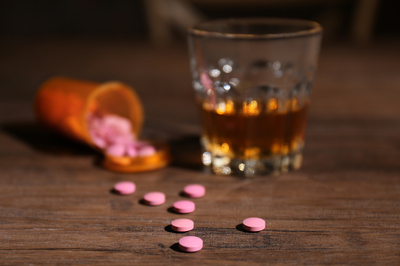
Think benzos are safe with alcohol because they’re prescribed? Think again.
Mixing drugs and alcohol is always a recipe for disaster, but one combination, in particular, is especially dangerous: benzos and alcohol. Here’s a closer look at these two substances, along with why using them together can lead to life-threatening results.
Dangerous Effects…
People often drink alcohol as a way to socialize, relax, and/or celebrate; however, many people fail to realize that it is actually a depressant. Alcohol blocks some of the messages delivered to and from the brain and also slows the function of the central nervous system.
The effects of alcohol vary depending on the person and are affected by many different factors, including age, health status, family history, and how much and how often the person drinks. While moderate amounts of alcohol may be safe for some people, drinking too much can lead to serious health problems for the heart, liver, and pancreas. Drinking is also associated with an increased risk of cancer and a weakened immune system.
….Times Two
Benzodiazepines, AKA “benzos,” are also sedatives that may be used to treat a number of health issues, including anxiety, nervousness, panic disorders, muscle spasms, sleeplessness, and seizures. Because they work in a similar way as alcohol, they are also sometimes used as a treatment for alcohol withdrawal.
Benzos, a class of drugs that includes Valium, Xanax, and Klonopin, are habit-forming and can lead to tolerance, which means patients may need higher doses with ongoing use. This, in turn, can lead to addiction and substance abuse issues. Lastly, because they lead to “high” feelings, they are frequently abused.
Like alcohol, benzos may be safe to use in some circumstances; however, they can also have serious side effects, including dependence and abuse, respiratory depression, withdrawal symptoms, seizures, slow heart rate, low blood pressure, increased heart rate, and fainting.
= A Deadly Combination
Unfortunately, the same thing that makes benzos an effective treatment for alcohol withdrawal also makes them unsuitable for combining with alcohol. Why? Because they have a similar effect on the central nervous system (CNS) and can, therefore, amplify each other’s impact. Not only do people who drink alcohol while taking benzos feel the effects of the alcohol faster, but the interaction between the two can lead to an increase in respiratory failure, overdose, and death.

The combination of benzos and alcohol can be a deadly one.
The same applies to benzos and opiates. Says Dr. Larissa Loukianova of the Mayo Clinic, “Both benzodiazepines and opiates are brain depressants. Biological interactions between benzodiazepines and opiates can lead to respiratory failure. Patients taking both benzodiazepines and opioids have a 15-fold increase in the risk of death, compared with those who are not taking those medications.”
Despite these threats, many people do mix benzos with both alcohol and opioid pain relievers. Says the Substance Abuse and Mental Health Service’s (“SAMHSA”) The DAWN Report, “Concerns exist about the increasing number of patients prescribed both benzodiazepines and opioids and about serious complications arising from the use of benzodiazepines with alcohol.”
While fatal overdoses on benzos alone are rare, the picture changes when other substances enter the equation. Says DrugAbuse.com, “It is estimated that approximately 80 percent of benzodiazepine abuse involves another substance, particularly opioids and alcohol.”
The takeaway, according to Loukianova: “Benzodiazepines are risky drugs; that’s the bottom line.” When you factor alcohol (and other drugs that depress the central nervous system) into the mix, the risks dramatically rise.
We’re here to help
If you or someone you love is abusing alcohol, benzos, or both, rehab may be a life-saving choice. To learn more about St. Louis drug rehab treatment, contact us at Harris House today.







